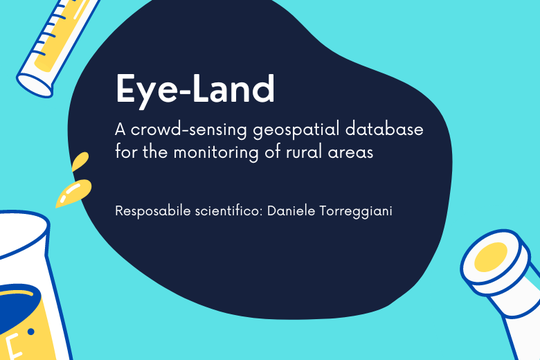Research program: PRIN
Coordinator: Università della Tuscia
Scientific Officer: Daniele Torreggiani
Duration: 08/05/2022 - 08/05/2025
Research group: Daniele Torreggiani, Patrizia Tassinari, Stefano Benni, Alberto Barbaresi, Marco Bovo, Giovanni Pollicino, Rao Priyanka, Filippo Zaniboni, Mattia Ceccarelli, Miki Agrusti
The current European and national policies (Green Deal, Farm to Fork, etc.), are strongly focused on environment protection; a deep knowledge of the territory and tools capable of providing updated and detailed information are necessary to properly deal with this issue. New survey tools are available to face the increasing demand for data; consolidated remote sensing technologies or more recent hyper-spectral systems (italian PRISMA Mission ie) offer powerful opportunity for Earth Observation. A profitable use of the remote sensing images (especially hyperspectral ones) requires a huge number of Ground Truths (GTs) which are expensive to be obtained. Further-more the health of the ecosystems, the agro-forestry and natural components of the territory, rural buildings and heritage, rural infra-structures, are not adequately monitored and requires numerous on field observations. Simple and common devices such as modern smartphones are equipped with more and more sophisticated sensors that, if properly used, can fill the demand for ground data. The purpose of this project is to create and test a "system" made up of software, procedures methodologies and contributors that can provide a quantity of widespread source data with a crowd sensing approach on a webGIS. Local operators (agronomists, forest police, park rangers, farmers, etc.), invited via software, can voluntarily contribute to the feeding of the webGIS using their personal sensors and their experience. The contributors will undergo a specific training to learn the proper procedure for data acquisition. The “system” will consist of the webGIS platform, the acquisition procedures, the training of the contributors (tutorials), the management and free data disclosure policy documents, the data quality control system, the virtual reward system for the contributors. The system will be tested in different fields and different kind of data will be collected (land cover, rural buildings, rural heritage, dry stone artefacts, hedgerows, brooks, lines of trees, terraces, dry stone walls, ponds, non-cropped areas, etc.). Each research units will collaborate to the data gather-ing and will test the reliability of the system by using the information for different purposes: GTs for remote sensing images classifica-tion, rural buildings and heritage inventory, landscape quality assessment. The results of the individual trials will be important delivera-bles of the project and will allow to test and improve the system. The entire project will answer the growing need EU and local admin-istrations have for detailed territorial and it will become not only a model but also the basis for data acquisition in the rural context. Awareness raising actions will be carried out in order to involve both potential contributors and stakeholders such as administrations and local authorities, triggering a participatory process aimed at maintaining the system beyond the end of the project.

